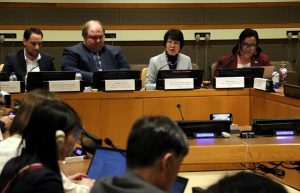Unbridgeable gap within NPT Preparatory Committee, Part 2: Agreement at cost of not being able to share “inhuman nature” of nuclear weapons
May 15, 2025
Japan goes along with nuclear-weapon states, turning its back on TPNW
by Fumiyasu Miyano, Staff Writer
During the second week of the Third Preparatory Committee for the 2026 Review Conference of the Parties to the Treaty on the Non-Proliferation of Nuclear Weapons (NPT), there was a noticeable decrease in the number of members of non-governmental organizations (NGO) and reporters observing the sessions. On May 7, Japan, Mexico, and Kiribati co-organized an event on nuclear disarmament and non-proliferation education at the United Nations Headquarters in New York.
Expressions in the statement weakened
“Japan attaches great importance to communicating the realities of the use of nuclear weapons.” Tomiko Ichikawa, Ambassador Extraordinary and Plenipotentiary Permanent Representative of Japan to the Conference on Disarmament, stressed the importance of listening to the testimonies of atomic bomb survivors in her speech. The essence of the survivors’ stories is nothing but the inhumane nature of nuclear weapons. During a Preparatory Committee meeting on May 2, Ambassador Ichikawa also expressed that Japan is “fully aware of the catastrophic humanitarian consequences of the use of nuclear weapons.”
The Preparatory Committee questioned whether this recognition was shared with member states, especially with nuclear-weapon states. The Joint Statement on Disarmament and Non-Proliferation Education, compiled and delivered by the Japanese government on May 1, did not include the phrase “the catastrophic humanitarian consequences” of the use of nuclear weapons, which appeared in a similar statement delivered at the 2022 NPT Review Conference. Instead, the wording was weakened and paraphrased as “devastating and multifaceted impacts and consequences.”
According to multiple diplomatic sources, the United Kingdom expressed disapproval of the term “humanitarian,” as emphasized by promoters of the Treaty on the Prohibition of Nuclear Weapons (TPNW), fearing that it might undermine the legitimacy of possessing nuclear weapons. The government agreed to delete the word in an effort to get at least one nuclear-weapon state’s involvement.
However, the decision came at a cost. Austria and New Zealand, which lead the TPNW, opposed it and did not sign the statement. Conversely, Japan did not join the joint statement issued by Austria on the final day of the conference that urged the United States and Russia to conclude a nuclear disarmament treaty.
“What possible meaning can there be?”
Ambassador Ichikawa, who agreed to an interview after the conference ended on May 9, was proud of the “forceful expressions” in the Joint Statement on Disarmament Education, which a record 96 nations approved. However, a diplomatic source wonders: “What possible meaning can there be in a statement that does not express what one truly wants to say?”
The government of the country to have suffered atomic bombings during war has turned its back on the TPNW, refusing to join or participate even as an observer. It has a strong desire to demonstrate results within the NPT framework, which includes nuclear-weapon states. Takeshi Iwaya, Japan’s foreign minister and the only ministerial-level participant, gave a speech on the first day of the Preparatory Committee’s general discussion. After the speech, he spoke enthusiastically to the press corps: “We would like to strengthen our efforts to compile outcome documents at the Review Conference.”
The Japanese government, which also submitted the proposals from the International Group of Eminent Persons, led by Japan, to the preparatory committee, claimed that “many of the elements emphasized by Japan have been reflected in the draft recommendations.” They include: national reports enhancing transparency of nuclear capacity; a moratorium on the production of fissile materials for use in nuclear weapons; and disarmament and non-proliferation education.
Having said that, an ambitious “five-year national action plan toward nuclear disarmament” was not incorporated. The adoption of the draft recommendation was postponed in the first place. The status quo shows that States Parties are even unable to agree on the inhumane nature of nuclear weapons. Ambassador Ichikawa took the precaution of saying the following about the NPT Review Conference, which is scheduled to take place a year later: “It is important to agree on the document, but it is equally important to recognize the NPT as the fundamental framework for nuclear disarmament and non-proliferation.”
(Originally published on May 15, 2025)








